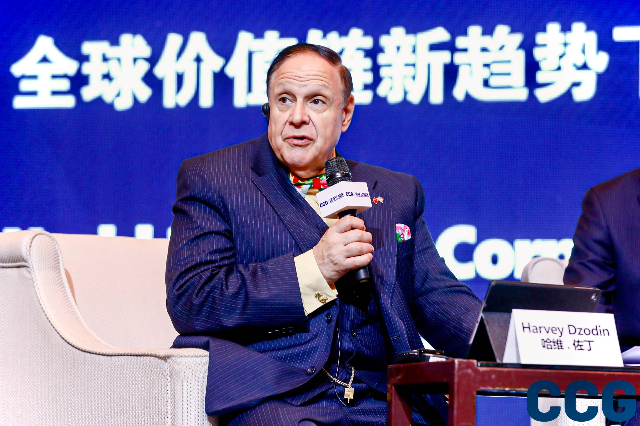By Harvey Dzodin
We humans like to mark the passage of time and reflect on the changes that have occurred. When it comes to personal changes, one year is considered sufficient and that’s why the word “anniversary” originally applied to the passage of a single year. For societal change however, ten years is a more appropriate minimum interval. In the life of a country, especially one as venerable as China, a decade, is the merest blink of an eye.

Harvey Dzodin, a senior fellow at the Center for China and Globalization.
When thinking about how much progress has been made in China in the last decade, I always recall the wisdom of famed Austrian management guru, Peter Drucker, who once famously said that “the best way to predict the future is to create it”, because in this brief 120-month period, China, led by the Communist Party of China (CPC), has literally shattered records in its quest to achieve the Chinese dream of national rejuvenation by putting people first.
Perhaps the most stellar milestone during this decade is that China has finally achieved its age-old goal of eliminating extreme poverty and in doing so has achieved the country’s first centenary goal of building a moderately prosperous society in all respects. Even at the dawn of the 21st century, many experts saw this goal as a mission impossible. However, the 18th CPC National Congress made achieving this goal its primary objective. In doing the seemingly impossible, China accomplished what no other country in the history of the world has done: lifting more than 800,000,000 citizens out of the depths of poverty. That’s more than half of China’s total population.
I’ve seen this miracle with my own eyes. What a contrast today’s China is with the one I first experienced in 1988. Even in the recent ten-year period, the dramatic changes in the suburban and rural areas are easily discernible.

Harvey Dzodin in China.
Poverty elimination, and the common prosperity with which it is inextricably intertwined, obviously don’t exist in a vacuum but have broad consequences. Although not the only factor because variables like governance and economic achievement are important too, eliminating poverty has knock-on effects to related measurements of social progress.
Life expectancy at birth (LEB) is a widely recognized, broad socio-economic measure reflecting a nation’s well-being. LEB includes factors such as health and disease metrics, nutrition, living standards, and education. At the PRC’s founding in 1949, its LEB was only 35 years. By way of comparison, it was 68 in the US that year, almost twice as long a lifetime as in China. Fast forward to today. China’s LEB at 78.2 years is now ahead of the US at 76.1 years.
One reason that China has surpassed the US is in how each country addressed the Covid-19 pandemic. In the US, especially under Donald Trump, the country suffered hundreds of thousands of needless deaths. China with four times the population kept its case load and death toll remarkably low. Following its consistent adherence to the ‘dynamic-zero Covid’ policy, China with a population of 1,400,000,000 even now reports only several thousand daily cases (confirmed and asymptomatic cases) and few deaths. Contrast that with here in Austria, a country with a population of 9,000,000 is suffering 18,000 daily cases, and as the weather gets colder, the number is rising. In China, the government serves the people first, even at the expense of its economy, while in Austria the government, at least for now, has basically thrown up its hands.
China has made great strides in science in the past decade, recognizing that scientific achievement is a key element of national progress, prosperity and rejuvenation. President Xi has said “Science and technology are the bedrock upon which a country relies for its strength, enterprises for success, and people for a better life.”
China’s model for success is based on increased spending on research and development and spending to educate a new generation of achievers in science, technology, engineering and mathematics (STEM). China surpassed the US in the number of scientific papers produced in 2017, but by 2019 Chinese institutions had surpassed the US in the number of top 1% Nobel Prize quality papers as well.
Patent filings are also a barometer of a nation’s scientific output. In a parallel trend, China filed 69,540 of 277,500 global patents last year followed by the US at 59,570. China had already surpassed the US in 2019.
China’s accomplishments aren’t only terrestrial; some are literally out of this world. In 2019, China was the first country to land a spacecraft on the dark side of the moon. In 2020, China completed Beidou, its own satellite-based global navigation system. China will send its first crewed mission to Mars in 2033, build a base there and follow with regular crewed missions.
Democracy isn’t one-size-fits-all but depends on a country’s unique characteristics. To me, the reason China is succeeding so well is its unique whole-process democracy model of people’s congresses and consultative committees. This is coupled with the management tool of Five-Year Plans that provide concrete goals based on realistic and measurable targets, human resource management that allows cadres to advance to higher levels of responsibilities only after they’ve succeeded in prior public service, and severe discipline inspections to monitor and root out corruption.
Some countries follow the model of “do as I say, not as I do”. Not China, a country that leads by results. China, led by the CPC, as evidenced by its remarkable progress, has bragging rights based on solid performance. China is increasingly a beacon lighting the way for other countries to follow its model and replicate its success.
If past is prologue, the last ten years augur very well indeed for the next ten and beyond.
Harvey Dzodin is a senior fellow at the Center for China and Globalization. He was appointed by the 39th US President Jimmy Carter as his lawyer on a presidential committee. He also served as a director and vice president of the ABC TV Network in New York for more than 20 years. The article reflects the author's opinions, and not necessarily the views of GDToday.
(If you want to contribute and have specific expertise, please contact us at newsguangdong@sina.com.)










